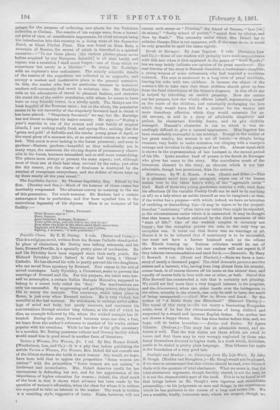Matrimony. By W. E. Norris. 3 vols. (Smith and Elder.)—This
is a pleasant novel (one part excepted, where one of the heroes makes love to the other hero's wife), of the "agreeable rattle" kind. Each of these two young gentlemen marries a wife, each fixes his affections (if the variable Freddy Croft can be said to fix anything at all) on a lady about as unlike himself as can be imagined ; so that, if the writer has a purpose—with which, indeed, we have no intention of crediting or discrediting him—it may be taken to be the proposi- tion that " matrimony" often turns out better than might be expected, in the circumstances under which it is contracted. It may be thought that this lesson is further enforced by the third specimen of this "state of life." One of the wedded couples is certainly not happy ; but the exception proves the rule, in the only way an exception can. It turns out that theirs was no marriage at all. Hence it is to be inferred that if matrimony is to be successful, one must not have a former husband such as the odious Mr. Hirsch turning up. Serious criticism would be out of place in reviewing this tale ; but our readers will not repent it, if they take our recommendation and send for it.--Jeannette. By Mary C. Rowsell. 3 vols. (Hurst and Blaekott.)—Here we have a love- story of nearly a thousand pages: The chief dramatis persons are two sisters and a baronet, who, having been long absent from his country, comes beak, is of course thrown off his horse at the sisters' door, and equally of course falls in love with one or other, or both. Out of this Miss Rowsell has constructed a tale that is certainly not pleasing.
We could not feel more than a very languid interest in its progress, and the denouement, when one sister hands over the bridegroom to the other, actually in the church, can only be said to have the merit
of being unexpected.--Civil War in Home and Land. By the author of "A Bride from the Rhineland." (Samuel Tinsley.)—
The moral of this story is—Do not marry a fascinating Hungarian noble, even if he has the recommendation of being disliked and suspected by a stupid and ignorant English father. The author has not chosen a happy theme. She has done bettor before this, and, we hope, will do better hereafter.—Duties and Duties. By Agnes Giberne. (Seeleys.)—This story has an admirable moral, and en-
forces it well. That the first duties are those which are owed to home, and that these may be very wrongly neglected by those who fancy themselves devoted =to higher work, is a truth which, doubtless!, needs to he stated in pretty plain language. Miss Giberne has made it the foundation of a very good tale.


































 Previous page
Previous page